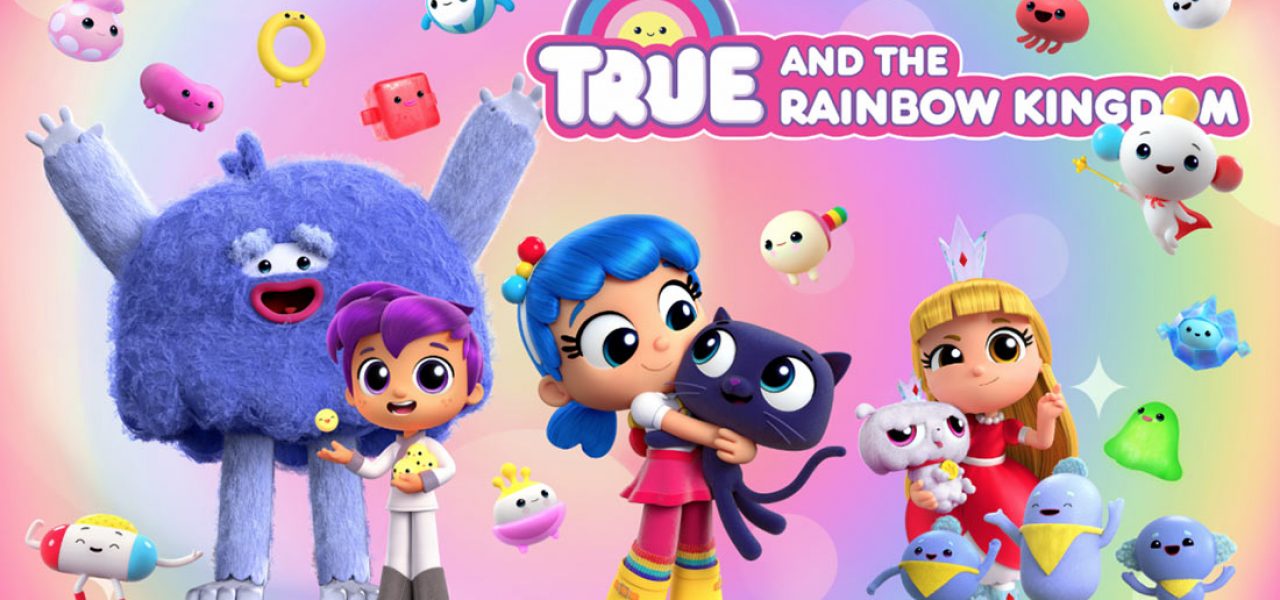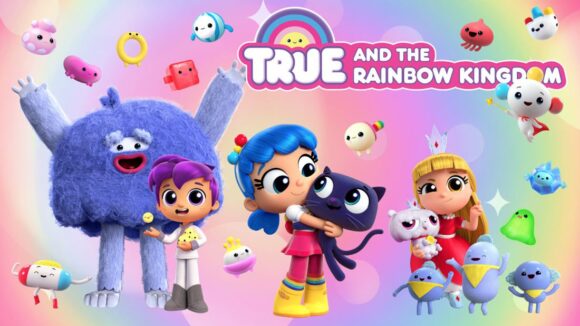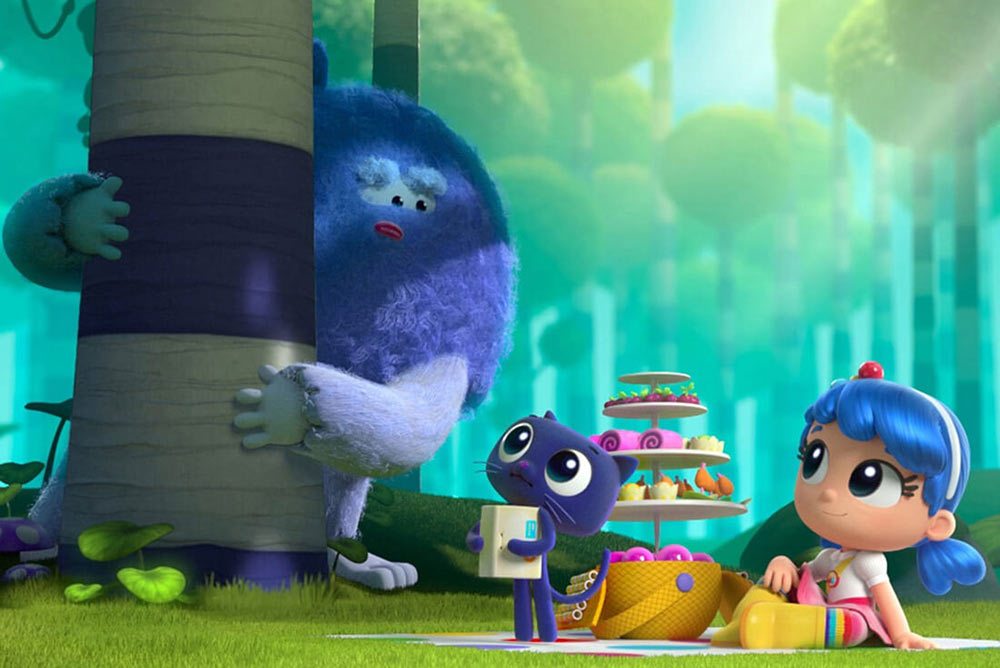

Crafting A Show With Netflix: Guru Studio’s Frank Falcone On ‘True and the Rainbow Kingdom’
These days, Frank Falcone is a hard man to catch up with. The founder of Toronto-based Guru Studio has patiently grown his once-small animation studio into a 320-person machine producing a new show for Pharrell Williams and Netflix, along with at least four other shows in production.
Having so many shows in production at your studio is a good problem to have if you’re running an independent shop. “But in the same way, I wish it didn’t always pour when it rains,” Falcone breathlessly laughed, once we finally caught up by phone. “But that’s the balance in this business. We’ve been really busy for a long time, so it’s all good.”
The sweet irony is that Guru’s latest cgi attentions have been paid to the organic goodwill of True and the Rainbow Kingdom (10 x 22-minute), streaming now on Netflix. Its environmental sensibility and good-natured world-building — based on the inflatable installation art of Miami duo Friends With You — take pains to transmit a meditative education on a world going way too fast, too wrong.

Guru’s previously acclaimed series, Justin Time was a boy-led adventure through history delivered with balance and wit. True and the Magic Kingdom is a girl-led adventure through fantasy, invested in animism and interconnectedness.
“It’s good for kids to see that there is a big, wide world out there, and in many ways that’s what Justin Time was really about,” Falcone explained. “We softly reminded everyone that we’re part of a very long history of humanity. The message of True is that we are part of planet Earth, which is as alive as we are. That’s animism; everything has a life and spirit to it, if you pay attention.”
There is a payoff for paying attention in True. Its eponymous heroine (voiced by Michela Luci) and her wisecracking cat, Bartleby (Jamie Watson), always visit a living Wishing Tree and a wise Wishologist (Dante Zee) to calmly reason before leaping into action. It’s an unusual but smart braking of children’s-programming-as-usual, which often favors acceleration and chaos.
“That was a challenging thing to put on screen,” Falcone said. “To hold people’s attention while you’re slowing down a story that’s moving at breakneck speed, to suddenly hit the brakes and take a breather, to relax and and make the moment mindful.
Added Falcone, “Throughout the process of making True, I found myself literally taking a breath. I hope it reminds kids that when things get crazy, they can take a breath, figure it out and make the right decision. That’s a good takeaway for kids, and grown-ups.”
Especially, it seems, girls.
“This one is for the girls!” Pharrell Williams shouted into the mic at a summer press event for True, into an audience of families leaning heavily toward mothers and daughters. Williams explained that his love of Friends With You’s sweet, spirited art installations wasn’t immediately taken seriously as a show by the usual studio suspects. But once Netflix and Guru got in the mix, things picked up quickly and True was alive and flying in comparatively little time.
“It took a couple of years, but by no means was it one of those 15-year development cycles,” Falcone explained. As mentioned, Guru hasn’t had much time for breathers since.
“We did not rush to grow the studio; that was not part of the plan,” said Falcone. “In the early days, we carefully chose what we wanted to work on. I didn’t get to television until I was approached to work on The Backyardigans, which I thought was an awesome show. I didn’t like any of the projects I looked at when I was working on commercials.”
Falcone searches for projects that he’d personally like to work on himself as an animation artist, and hopes his taste is reflected in the people who choose to work at his company. There’s a reason for selecting projects judiciously, he said. “I’m really selective, because I believe that you become what you do — and if you start doing stuff you don’t like, then you start to lose your sense of taste. We ingest very carefully.”
Lately, Guru has been ingesting (a lot) with Netflix, a unique partner rooted more in content distribution than programming production. This makes Netflix easier to work with for producers with previously existing visions, Falcone explained. Traditional networks, who Guru has also worked with, have a tendency to, let’s say, pop into the office with pointers, whether they should or not.
“Netflix really doesn’t have to be precious about their commissions, because it is a level playing field,” he said. “You don’t really get a prime spot on the appointment viewing schedule; you are just put into their library of content. So it’s up to you as a producer to make the best show you can. We’re trying to be diverse and not play the same two notes over and over again.”
He finds Netflix’s trusting approach with producers to be refreshing. “Their involvement is more guidance and [offering] perspective on other shows it’s producing, so you don’t bump up against anything else too similar. But Netflix is not trying to tell you what your show is, which is sometimes the problem with more traditional networks.”

Ironically, Netflix’s trust can push its partners to push themselves instead. After the online streamer acquired the first two seasons of Justin Time, produced in Canada in partnership with Disney, Netflix decided the show’s success would speak for itself and bankrolled a third season, Justin Time Go. Whether it is trust or psychology, or both, Netflix has seemingly little trouble picking up talented partners like Guru to materialize their plug-and-play visions — an instructive lesson for networks that can’t shake Netflix from their rear-view mirrors.
“I’m proud to say they looked at a couple premises, read one script, and then said, ‘Go! Make the rest,’” Falcone said. “So it literally was Justin Time Go! It was like dad giving you the keys to the Lamborghini and leaving for the weekend, and you’re going, “But …but …but … but…” In fact, we worked even harder after that, because we thought if we screwed it up, we would never get to work with Netflix again.”
“It really was a bit of reverse psychology, because you end up caring even more, knowing that Netflix has so many people willing to bring them a show. If you don’t know what kind of show you want to make, you’re probably not going to thrive with a partner like Netflix. We are in the era of creative team-led shows. There is far too much to watch for anyone to give us filler content. There is no room for that in this world.”
